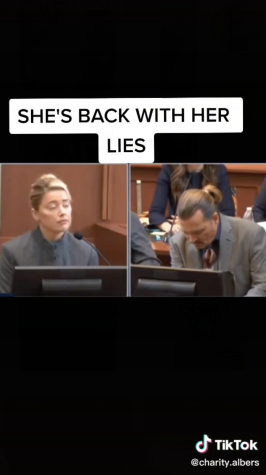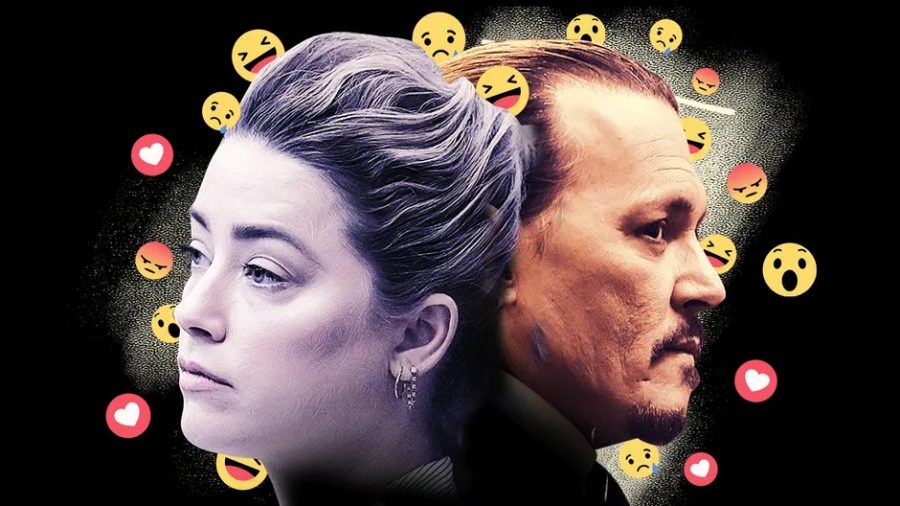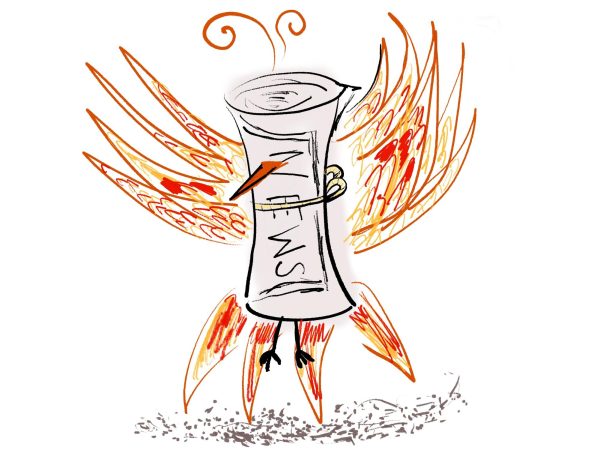Opinion: Social Media vs. Depp vs. Heard
Why social media posts with sexist undertones negatively affects how domestic abuse is portrayed
Social media made it all too easy for issues of domestic abuse to be overshadowed by the wild case between Heard and Depp and for sexism to lurk in the shadows of these posts.
On April 11 in Fairfax, Virginia, the defamation lawsuit Johnny Depp filed against former wife Amber Heard came to trial. And the public went crazy. Posts and reposts with hashtags #MePoo, #JusticeforJohnnyDepp, and #Amberturd went viral, making fun of Amber Heard in the process and idolizing Johnny Depp. However, social media made it all too easy for issues of domestic abuse to be overshadowed by the wild case between Heard and Depp and for sexism to lurk in the shadows of these posts.
Depp is suing Heard for $50 million for an op-ed article she wrote in The Washington Post in 2018. Heard countersued Depp for $100 million, claiming that he conspired with his past lawyer, Adam Waldman, to defame her by calling her case an “abuse hoax” in The Daily Mail.
In Heard’s article, she wrote, “I became a public figure representing domestic abuse, and I felt the full force of our culture’s wrath for women who speak out.” Although Heard never named him, from this article, readers inferred that she was facing domestic abuse from her then partner, Johnny Depp. Even though Heard is coming under fire for this very statement, it seems there is truth to what she is saying as she is currently being belittled for speaking out by the media.
The abuse allegations people make are personal and serious. However, their personal relationship was still exploited and ridiculed in the media. This is unfortunate as there is always more to a story than what meets the eye. Guidance Counselor Mrs. Megan Broderick said, “I think that it’s really sad that their personal affairs are being dissected in the media and clearly they have a complicated relationship…such is the peril of being in the public eye.”
On May 14, 2022, actors on the show Saturday Night Live performed a skit where they ridiculed and made fun of the case. In the cold open, when Depp’s attorney (played by Aidy Bryant) says there was surveillance footage showing the “fecal matter” Heard allegedly placed in Depp’s sheets, the judge (played by Cecily Strong) allows it, using the reasoning “because it sounds fun and this trial is for fun.” She then proceeds to watch the rest of the surveillance footage saying that “it’s funny.” Of course this is satire, but the reactions of the judge are very similar to that of the media. The mere fact that people are using the trial for their entertainment means that issues of domestic abuse aren’t being emphasized more than the jokes and memes that come out of the case.
There are two types of social media posts where topics were also desensitized or misunderstood. The first type are the memes and skits. A TikTok posted by @orabeach gained 87.2k views. In this TikTok, they put the sound “Monkeys Spinning Monkeys,” a lighthearted sound, behind very selective footage of the trial. In this footage, Heard recounts her use of makeup to cover up the bruises she claims Depp inflicted on her. However, they say that she is trying to get an advertisement deal from the makeup companies and make fun of her claims.
Another viral TikTok video showed Heard on the stand while a cut-out of Kim Kardashian says, “so cringe.” This TikTok garnered over 5 million likes. People seem to have already cast judgment upon Heard, brushing aside her claims. The people who post these videos seem to have felt that it was just to make fun of someone recounting possibly traumatic events or alleged abuse. Their pain has become the media’s source of entertainment.

The other type are the people that attempt to dissect the case. These people try to disprove Heard’s testimony and story by trying to find subtle movements or clues to hint at her guilt. It is important to note that oftentimes, the users making insensitive videos are not professionals nor are they experts, so when they post their biased judgements on social media, they are oftentimes misinforming or choosing selective clips of the trial for their audience.
And it’s not only TikTok that spreads this type of dissecting fever.
People on Instagram have spread a series of memes and tweets that ridicule the case, especially the reactions to testimonies and witnesses in-court. On Instagram, #amberheardisanabuser has been tagged in 43,680 posts.
Depp and Heard’s marriage counselor testified that the abuse went both ways, reminding us that it is important to remember that abuse can be inflicted by both people, not just one person. Even though this may be the case and Depp and Heard are both claiming that the other abused them, why is Heard the only one receiving hate? In addition to the effects that these posts have on domestic abuse, there seems to be misogynistic undertones behind these posts.
There are even evidence and text messages that show Depp using abusive language and calling Heard names and texting messages that said “let’s burn Amber.” When asked about these messages in court, Depp claimed that it was not “intended to be real.”
Many posts utilize the stereotypical “evil, scheming woman” trope that is portrayed in movies. Additionally, people have made conspiracy theories from the clips shown of the trial. Some of those theories are that Heard used her skills as an actress to fake-cry in court and that she is a drug user and cannot be trusted. However, it is important to note that there is clear documentation that Depp also used drugs and alcohol. Despite incriminating evidence against both people, Heard is still being ridiculed regardless of the facts.
There seems to be favoritism and a hunger to find a “hero” and “villain,” the “innocent man” and the “evil woman.” Those on social media are treating this case like a movie for their viewing pleasure. According to an article published by Insider, Heard-supporters who were interviewed received many hate messages that used “misogynistic expletives and several comments contained threats of sexual or physical violence.” Even though the verdict has not been declared, these hateful comments send the message that Heard is, without a doubt, guilty and reinforce the misogynistic culture of silencing women experiencing domestic abuse before the MeToo Movement.
Mrs. Broderick thinks that another possible reason for why many people are insensitive to the topics addressed in the case is that it “feels far away.” Oftentimes in these cases, people post on social media because they don’t “consider the real people behind the story and the hurt that could be causing to [the people affected],” she continued, “how can we find ways to respect that these are real people, not just some show for all of us.”
Additionally, what effect does this case have on other people who are suffering domestic abuse? Because issues of domestic abuse and violence were exploited for everyone to see, the case sets an example for others who are experiencing the same issues. Does the fact that support for Amber in 2018 quickly switched to one of disdain speaking out mean that this could be the case for all women? The case of domestic abuse between Amber Heard and Johnny Depp could instill the fear of their affairs being published and ridiculed in victims of domestic abuse and discourage them from coming out.
According to Balbir Gurm and Jennifer Marchbank, authors of the 2020 book Making Sense of a Global Pandemic: Relationship Violence and Working Together Towards a Violence Free Society, around 70% of domestic violence cases go unreported.
Twahna P. Harris is chief executive officer and executive director of The Butterfly Society, an organization in Baton Rouge, Louisiana that directly helps victims and advocates to end domestic violence. She had also endured three years of domestic violence and said that case “revictimized” survivors. “You’re not believable apparently,” she said in response to the social media reactions, “it’s a slap in the face to victims and survivors.”
“[The people in the media] aren’t thinking about what it must be like to go through this and the scrutiny. They’re still humans,” Mrs. Broderick said. Even though the MeToo Movement has increased awareness of issues like domestic abuse on social media through messages like “Believe Woman,” it seems that it is still “trendy” to use domestic abuse situations as entertainment—and to believe whoever one personally thinks is right, not the facts of the case.

Summer is a senior and Editor-in-Chief of The Tower. This is her fourth year on the staff and third on the editorial team, previously serving as a story...







